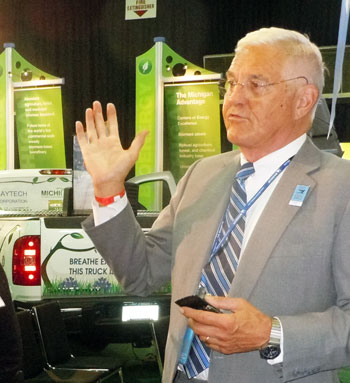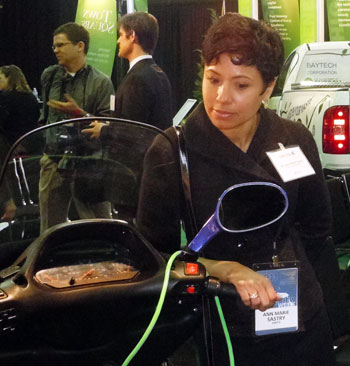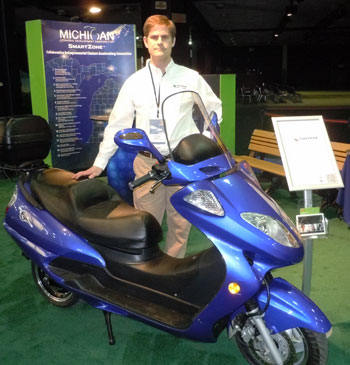Lutz Rides Current Motor’s Potential
Editor’s note: The Chronicle first wrote about Current Motor back in April 2009.
On the second day of the recent press preview at the 2011 North American International Auto Show in Detroit, a group of Ann Arborites gathered around a sleek-looking, gleaming blue electric scooter and exchanged banter.

Bob Lutz, an investor in Ann Arbor-based Current Electric, plans to take one to the firm's electric scooters on the road when "the snow is off the highway." (Photos by the writer.)
“So, Bob,” says Erik Kauppi, founder and chief engineer of Current Motor, the maker of the scooter. “Are we going to see you tooling around Ann Arbor’s streets on one of these things soon?”
“Bob” is Bob Lutz, the father of the electric Chevy Volt, the sexiest young thing at the auto show – on four wheels, that is. “As soon as the snow is off the highway, I’ll stop by with my checkbook,” Lutz says.
Lutz is now retired from GM, but is far from quitting his advocacy of electric vehicles. He opened up his checkbook last year to Current Motor, becoming an investor in, and adviser to, the company. Just how much did he invest?
“It’s enough to demonstrate a solid interest and small enough so that if this fails I won’t be terribly distressed about it,” Lutz says. “That’s the way I like to invest.” But, he says, the leadership at Current is going about it the right way, so he is confident in their success.
“They know where they’re going and they’re going about it the right way. They don’t have dreams of grandeur like Vetrix did, when they put hundreds of millions of dollars in and then built a huge plant to produce 80,000 a year, and sold 5,000,” Lutz says, referring to a now-infamous and oft-cited blunder of one of Current’s competitors.
Peter Scott, Current’s president, is proud of the way the company bootstrapped itself, armed with just a few hundred thousand dollars from investors. Competitors like Zero or Brammo needed millions of dollars to bring their products to market. Vetrix, Scott says, spent $180 million to get their electric scooter to market. “We did it for under $400,000.”
Part of the reason is that while the Current is assembled in Ann Arbor, none of the parts are manufactured here. They don’t make the plastic or metal. Current develops the electronics and the critical control systems and then they “tie the components together into a better bike.”
Also, “getting to market,” in Current’s case, means about a half-dozen test bikes being driven by initial customers. Current’s first customer was a guy in Atlanta, who tested out the company’s “beta bike.” Based on his input, they made a great deal of engineering improvements over the course of last summer. They’ve delivered a total of six pre-production bikes in Ann Arbor and a couple of other cities.
This strategy of having just a few enthusiasts test drive and review their bikes worked so well, now they’re trying it on a larger scale. At the auto show, the company announced a “test pilot” program. They’re going to lower the price by about $2,000 – placing it in the $4,000-$6,000 range, if customers agree to give them feedback and to tell all their friends about their bikes via social media.
“We want to get the bikes in people’s hands, we want real customers to tell us what is good and bad about the bikes,” Scott says. “We obviously have to bring on more support people, so we are really going to make sure that those are happy and satisfied customers.”
Scott is confident that these “happy and satisfied” customers will spread the word once they get on these bikes. Not only do people “want to be green and want to be seen being green,” he says, but there is something about riding these things that is a transformative experience. He calls the reaction he sees from newbies after a test ride “The Electric Vehicle Grin.”
“They just have a big smile on their face, and they go, ‘It’s so quiet.’ That is the best-selling feature,” Scott says.
The company was formed about two years ago when Ann Arbor’s John Harding bought a Chinese-made electric scooter “and quickly broke it.” So, being a DIY tinkerer, he fixed it himself, then started assembling more, himself, to sell. Harding met Erik Kauppi, the brains behind Current’s control system, and together they set off on a path to build a better bike.
Scott came into the picture later, when Harding and Kauppi asked the business incubator Ann Arbor SPARK to give them a hand in building a business plan.
“But, then, you know, SPARK likes to do these dating things where you work for the company,” Scott says. “You look at them, they look at you, you like each other, then I joined the company full-time a little over a year ago.”
Why? Because, he says, the inventors know what they’re doing, they’re good guys, and “In general, I’m a greenie. … And I love developing new markets that don’t exist.”
And, despite all you read about the future of transportation being electric, the market is still in its infancy. Even electric guru Bob Lutz knows that.
“The whole electrification of cars, the media kind of gives the impression that, well, in two to three years, everything will be electric,” Lutz says. “No, it’s going to be a very gradual transition. Twenty years from now, electric vehicles may account for 15%, max, of total new vehicle sales.”
The transition will be gradual, but even American society will change – perhaps not as quickly as Asians or Europeans – but it will change.
“Twenty or 30 years ago,” Lutz says, “you suggested to somebody that they look at a compact car and they’d say, ‘I’ll be damned if I ever put my family in one of those little tin cans. Give me a Buick Roadmaster, one of those 20-foot monsters.’ And now everybody looks at those and says, ‘I can’t believe I actually drove one of those.’”

Scooter-agnostic Ann Marie Sastry, CEO of the lithium-ion battery startup Sakti 3, which is based in Ann Arbor. She's standing next to a scooter made by Current Electric.
So, meanwhile, back at the auto show, Lutz, Kauppi, Scott and others gathered around the display model, exchanging technical details. Standing next to Lutz is Ann Arbor’s Ann Marie Sastry, a University of Michigan professor and CEO of the lithium-ion battery startup Sakti 3 – another startup that promises to change the world. For now, they discuss the future.
“We’re going to remain battery-agnostic as we develop our scooter,” Kauppi informs the group.
“That’s OK,” Sastry replies. “We’re remaining scooter-agnostic as we develop our battery.”
About the writer: Howard Lovy is a Michigan-based freelance writer who focuses on technology and innovation.




